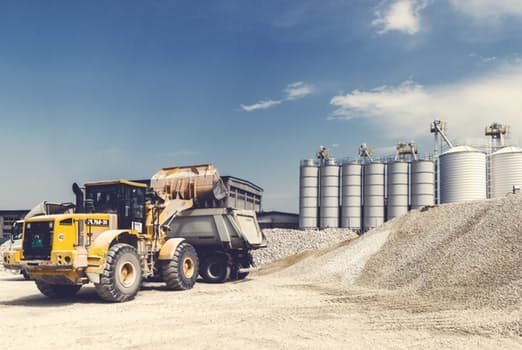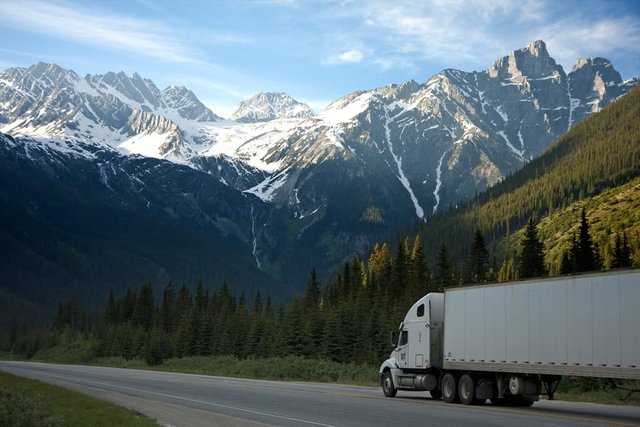If You Want Jobs, Take Away Their Shovels and Give Them Spoons
One of the most common careers in the US is a truck driver. About 3.5 million people depend on these jobs for their livelihood.
Okay, but what the heck does this have to do with shovels and spoons?
Patience, young grasshopper. I’ll get there.
With a high degree of confidence, I'd venture to guess that twenty years from now, 95%+ of these truck driving jobs won’t exist; self-driving trucks will replace them. It’s my prediction we’ll start to see this change to self-driving trucks within five years, and then we will see a complete shift over the following fifteen years.
“3.5 million people will be out of work, we must stop this madness!”
Let’s hold off on jumping to this conclusion.

Shovels and Spoons
A while back I saw a Youtube video with an old speech from Milton Friedman. He told the following story:
I went to China where a handful of government bureaucrats showed me some of their various undertakings. One, in particular, was a canal-building project. We got to the site and I couldn’t help but notice the lack of heavy machinery.
I said to the bureaucrat: “Why are the workers digging with shovels? Where are all the machines?”
He replied: “You don’t understand Mr. Friedman, this is a job-creation project!”
I said: “Oh, I thought you wanted to build a canal...If it’s jobs you want, why don’t you take away their shovels and give them spoons?”

The point is, job creation doesn’t matter. What matters is wealth creation. The canal creates wealth by improving the efficiency of commerce. Many people say they want jobs, but they don’t actually want jobs. They want the wealth that the job creates for them.
The seen vs. the unseen
When you see 3.5 million people losing their jobs to technology, it’s easy to jump to the conclusion that it’s a bad thing. However, there’s the seen (3.5 million jobs lost) and there’s the unseen (all the benefits that come with it).
When trucks become automated, they’ll do so for one reason: because all things considered, it’s cheaper.
Self-driving trucks don’t fall asleep at the wheel. They don’t take unforeseen breaks to go home and see their family, resulting in delays for delivered goods. They don’t have to sleep for eight hours each day at a rest stop. They don’t require a wage. They won’t sue you for harassment or discrimination. They don’t have to be paid overtime or time and a half on holidays. They don’t complain about their route being too long, too short, or to a undesired destination. They come to work and do their job. Any time of day or night.
When it becomes less expensive to transport goods, said goods become cheaper than they would’ve been otherwise. These lower prices improve everybody’s standard of living.
What will happen to the truck drivers?
Before we get to the truck drivers, let’s roll the clock back 200 years - before the industrial revolution. There was virtually no unemployment. That sounds great, right? Well...Everyone had a job - most doing physically demanding labor, working sixteen-hour days, and doing so 6 or 7 days a week.

The early 1800s was a time when 80%+ of the population worked in agriculture. Compared to today’s puny 2%. Why were such an enormous number of people working in agriculture? Because growing food was so inefficient that 80%+ is the amount of labor it took to feed the entire population. Today, with just 2% of the people in agriculture, we can feed the entire population thanks to advancements in technology, knowledge, and processes.
So what happened to the other 78%+ percent? Are they unemployed because a machine replaced them? Of course not. Advancements in technology helped make food more abundant, which freed up the labor of those farmers to make other products and provide alternative services.
Just because truck drivers are replaced by automation, doesn’t mean they won’t have a job. There are always things that need to be accomplished in a society. The market will create monetary incentives for their labor to be deployed to more urgently demanded fields of work.
What does this mean for society?
Anything that makes us humans more efficient is a good thing. There may be short term pain for individuals who have to find a new career path. But if we want people as a whole to realize an increased standard of living, we must embrace technologies and ideas that make us more efficient. Before jumping to conclusions, think about the unseen effects. Don’t fall into the idea trap of replacing shovels with spoons.
As a libertarian, I'm obviously familiar with the story.
And I want to say that you are correct. The things stated in this post are correct. I want people to read me say that.
Now, with that said.
It's still possible that an individual's life ends up being ruined by losing a job. It can't be helped, it's a part of life, and I don't think we should just end all progress because people depend on jobs.
But sometimes libertarians tend to downplay the fact that it can have disastrous ramifications for a person who misses his mortgage payments due to losing his employment.
I don't deny that it can be a difficult transition for particular individuals, and that point was addressed briefly at the end of my post. Also, for clarity, this wasn't written from a political point of view, but rather an economic viewpoint. If it came across as political, it was unintended.
Good post, still.
It's appreciated, thanks!
I agree with you as far as you go, but the effect can be even broader, especially in the medium term. Large scale automation and shipping jobs overseas have destroyed economies like those in pittsburgh and detriot.
Which is to say, sometimes automation isn't better for anyone really except the CEOs who pocket the increased profits, even looking at it from the widest possible angle and the longest term.
Realistically whats going to happen to these truck drivers as a demographic isnt that theyll get new, better jobs. Most of them will get new worse jobs as unskilled labor where theyll be making much less money. Because lets face it, if youre driving a truck for a living its not like you have a masters in computer science in your back pocket as a back up. Some of them will get no jobs at all. They'll be really poor, and eventually theyll die. There might be a few, especially younger people, for whom a burgeoning new industry represents an opportunity, but most of them it will be just poverty and death.
I mean the death was going to happen one way or the other... but for most of them their lives will be worse for having lost the jobs up until then.
I feel like your causation is backwards here. Farmers didn't lose their jobs because of the industrial revolution, they left their agricultural jobs for better jobs in industry created by the industrial revolution.
The farm owners had to automate (with tractors and such) i assume, to compensate for the increased cost of labor that came from competing industrial interests hiring the relatively unskilled workers that they used to be the only ones to hire.
In places where they could not do this (like the south) the industrial revolution never really happened.
The new industry created by the industrial revolution created new jobs... it had nothing to do with cheaper or more abundant food. In fact, food got more expensive during the industrial revolution, especially in england and western europe where it started. This was due partially to the labor shortage, and partially to war and increased foriegn demand.
Looking back over 60+ years of at times chaotic life, my observation would be that forced change is often quite beneficial. The trick is for the change-ee to respond with a constructive attitude. Perhaps that person will realize that being mortgaged was a bad idea to begin with. Perhaps they'll take action to implement a latent idea. Perhaps they'll find a much better "job."
The more positively we respond to "time and chance," the better off we are. ;)
I gotta say I agree with this. I was making six-figures in some important-sounding job in San Diego for a decade. One day I was laid off. Kinda out of the blue, there had been previous layoffs but I was always too critical over the years. I was tore up for a minute. Then I took a step back, thought about things. I spent a few months traveling then ended up moving to Sweden. I have a great job now, a kid, a new citizenship, my life ended up much happier and fuller. I don't make as much money as before but somehow I'm happier which is to me more valuable
"In some important-sounding job" haha
That's great that you found yourself a more fulfilling life.
Hi, @seanmeeh42, and thanks for "weighing in" on this interesting topic.
My cousin moved to Sweden when he was in his teens, married there and has lived there all his life... And yes, happiness in your life and work is far more valuable than lots of $$$! ;)
I believe it's possible to turn most "negative" events into something beneficial if you have the right attitude.
What do you think about a universal basic income? From my perspective, it is a very libertarian idea in that it creates an equal and more free market by actually representing the needs of consumer (general population). Not only that, you can get rid of government social programs (food stamps, unemployment, etc.) thereby putting the power back to the people on how our tax dollars are spent.
As long as it isn't tax funded
UBI will be another government-issued method of control of the population. Government has no money other than what it took from people and companies (well, this is not exactly true, there are government-owned companies, etc, but they don't earn enough). UBI is the wrong direction. Humanity should look into making basic services free and automated, so cost of living goes down instead of being given money to pay for services that government has no control over (hopefully). This is critically important difference and I wonder why people don't see it as it is.
What would be the means of exchange?
Prices will go down regardless as automation becomes more adopted. The question is who will own this automated economy. Whether basic services are free or have a cost, the general population will be dependent on it. By adopting UBI, you give the people an equal opportunity to participate in the free market, thereby having an economy more representative of the needs of the general populace.
You inspired me to finally write it down, thank you :)
https://steemit.com/anarchy/@macius/ubi-doobie-doo
Agree, that $125 billion bureaucratic waste from the pentagon could be a start.
https://www.washingtonpost.com/investigations/pentagon-buries-evidence-of-125-billion-in-bureaucratic-waste/2016/12/05/e0668c76-9af6-11e6-a0ed-ab0774c1eaa5_story.html?utm_term=.888de172993e
This is a common misconception. A business sets its price by looking at the demand curve and estimating how many units they will be able sell at each price point, then multiplying by profit per unit at each price point to figure out which price point will yield the most profit.
Which is a round about way of saying that a business will charge precisely what they feel the market will bear, and pocket any money they save from a decrease in production costs.
If a widget costs $100 before automation reduces costs by $10 per widget, then the effect of automation will be that widgets continue to cost $100, but Widget Co. International will pocket an extra 10 bucks per unit sold.
I'd agree with you if it were just one company realizing the cost savings. However, many other companies would see similar savings. I would contend that the companies would then undercut each other because they would now have the extra margins to do so.
Very thoughtful and interesting look at things. I am sure that people had the same worries in the past, that automation was going to be the end of jobs for millions of people, yet new jobs and new career opportunities spring out of new technology. It has always been that way, and will continue to be that way.
Thank you for explaining the connection between economics and technology.
Excellent post! We badly need to start discussing these issues, which (of course) are completely ignored by our governments.
Thank you. This topic is frequently misunderstood. The misconceptions always seem stem from the "seen vs unseen."
What a great application of Bastiat's reasoning to such a core factor of our global economy!
Great post, young grasshopper! I completely agree and especially like the "seen vs. the unseen" commentary.
I wrote something similar recently saying that if history is any guide we should be skewed optimistic towards tech, but most commentary seems to be negative:
https://steemit.com/economics/@finpunk/debunking-pessimism-about-automation-global-inequality-continues-to-collapse
I have been reading your posts lately, but I didn't see that one. I'll take a look!
cool, muchisimo gracias for the complement of noticing the posts. it's nice finding like minded people in this community...
Also nice seeing the first two writers I follow commenting on each other's posts :-D
ha, well we're still a small community...esp those of us blogging in the "economics" tag :)
The rules to redistribute the created wealth are not fair. We have to improve that.
Outstanding post, well and clearly presented.
Thank you!
Awesome post. For us in the creative field, the "money vs. wealth" aspect is critical. I've always held this perspective when looking at economic 'growth' on the national scale, whether they are actually producing long-term and viable value.